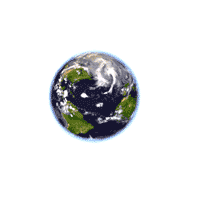Posted on April
22, 2024
Insignificance Vs. Ego
The eclipse and the "climate change"
narrative
By
Daniel
Clark
Much of the media coverage of this month's solar eclipse
focused on just how insignificant it showed us to be. The lesson to be taken from this is not, of
course, that people don't matter, but only that we are powerless in comparison
to the forces of nature. Unfortunately,
this moment of reflection did not last much longer than the event itself. Otherwise, it might have led to a discussion
of the arrogance it takes for human beings to assume the ability to save or
destroy the earth.
 In
those parts of the country that experienced the total eclipse, temperatures
dropped by ten degrees in a matter of minutes, and then bounced back just as
quickly. If we wanted to reproduce that
effect, there's no way we could ever do it, because the phenomenon was created
by processes that are infinitely beyond our control. It was the relative positions of the sun, the
earth and the moon that were responsible, not your car, your air conditioner and
your barbecue grill.
In
those parts of the country that experienced the total eclipse, temperatures
dropped by ten degrees in a matter of minutes, and then bounced back just as
quickly. If we wanted to reproduce that
effect, there's no way we could ever do it, because the phenomenon was created
by processes that are infinitely beyond our control. It was the relative positions of the sun, the
earth and the moon that were responsible, not your car, your air conditioner and
your barbecue grill.
By contrast, the narrative for the past several
decades has been that nature is not an awesome force, but instead is so weak
and fragile that it relies upon us to sustain it. Liberals flatter themselves with the conceit
that they're "saving the planet" through such vanishingly trivial acts as
carrying a cloth bag to the grocery store.
Insignificance does not even begin to describe it.
Nature, as a rule, is not constant. Yet eco-warriors count among their enemies
the inevitable natural processes of extinction, erosion, and introduction of
invasive species. In their zeal to save
the earth, they aim to freeze it in a state of suspended animation. The temperature of the earth is always either
rising or falling, however slightly. The
current warming trend is dwarfed by previous swings, which have been attributed
to fluctuations in solar and volcanic activity, and the wobble of the earth on
its axis. In other words, change is the
norm. Well, where's the fun for a
scaremonger in that?
Under the rubric of "climate change," they blame
mankind for "extreme weather events" like floods, blizzards and
hurricanes. To the earth, however, these
events are not extreme. They are routine
occurrences that would still to take place with or without the continued
existence of the human race. The
counterargument is that we are exacerbating these events, causing hurricanes to
become more severe and frequent, for instance.
What the statistics show instead is that these factors fluctuate over
time, just as one would expect. In fact,
from 1980 to date, the year with the fewest hurricanes worldwide, and the
second-fewest major hurricanes (Cat 3 and up), was 2021. The numbers for 2022 were barely more severe.
If the facts don't fit the narrative, then it's the
facts that must change. To wit, a
February article in a journal published by the National Academy of Sciences
proposes to crank the alarm bells up to eleven, or at least to six. The argument is that the rating of hurricanes
on a scale of 1-5 is not sufficient to illustrate the effects of "climate
change," so a Category 6 must be added.
The first storm to qualify for this new designation would no doubt be
deemed the worst hurricane ever!
How do we know that? As Nigel
says, "It's one louder, isn't it."
 The
belief that human beings can destroy or save the earth has manifested itself in
multiple cockamamie schemes designed to interfere with natural geological
processes. Among the "solar radiation
modification" measures that have been suggested are artificially injecting
sulfur dioxide particles into the stratosphere in order to reflect more
sunlight, and making clouds more reflective by spraying them with sea
water. If we really did have such
godlike destructive powers, one might hope our desire to tinker with them would
be tempered by knowledge of our own fallibility.
The
belief that human beings can destroy or save the earth has manifested itself in
multiple cockamamie schemes designed to interfere with natural geological
processes. Among the "solar radiation
modification" measures that have been suggested are artificially injecting
sulfur dioxide particles into the stratosphere in order to reflect more
sunlight, and making clouds more reflective by spraying them with sea
water. If we really did have such
godlike destructive powers, one might hope our desire to tinker with them would
be tempered by knowledge of our own fallibility.
Fifty years ago, there was a body of mainstream
scientific thought that believed the earth was cooling, not warming, and that
this cooling was also caused by human activity.
One of the remedies that was suggested at the time was that we
deliberately melt the arctic ice caps by covering them with soot so they would
absorb more sunlight. What if that
advice had been acted upon, only to have the melting of polar ice caps become a
factor in global warming doomsday scenarios twenty years later?
Kind of makes you wonder if, twenty years from now,
people will be asking what we did to cause the solar eclipse of 2044.
The Shinbone: The Frontier of the Free Press